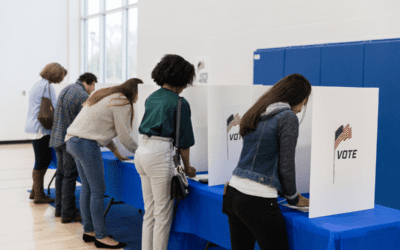
#image_title
Assembly Minority Leader says Democrats likely will not attend Monday’s ceremony. Meanwhile, state senators came up with compromised, safer inauguration plan.
For the first time in recent memory, Wisconsin Assembly Democrats and Republicans are swearing in their newly elected members in separate ceremonies, a result of Republican leadership deciding to move forward with an inauguration plan that defies COVID-19 public health recommendations.
All members of the Assembly, Republicans and Democrats, received an email from Rep. Tyler August (R-Lake Geneva) on Dec. 23 that outlined the Republicans’ plan for inauguration day.
The plans included dividing legislators and their guests into two groups. Freshmen legislators and leadership would be in the first group to be sworn in by Chief Justice Pat Roggensack. That group would then leave the Assembly chamber, allowing the second group to enter and be sworn in. Both groups would be in the Assembly chamber, spread out between the floor and gallery, for the closing of the ceremony.
Mask-wearing for lawmakers and guests is “strongly encouraged” said August in the letter. While Gov. Tony Evers and his administration have the ability to pass statewide mask-wearing rules, these rules do not apply to the Legislature, which sets its own rules.
On Monday, five days after the email was sent out, Assembly Democrats held their own virtual ceremony out of safety concerns. Evers officiated the event.
Assembly Minority Leader Gordon Hintz (D-Oshkosh) told UpNorthNews that in addition to being unsafe, it was unfair to his colleagues who are immunocompromised that they would have to choose between participating in the ceremony and their health.
Unless the plan for the event changes, Hintz said he and other members of the Democratic Caucus do not plan to attend Monday’s inauguration at the Capitol.
“All of our members have been sworn in,” Hintz said. “We have hospitals and doctors that are begging us not to do the things these guys [Assembly Republicans] are doing.”
Rep.Beth Meyers (D-Bayfield) fondly remembers her freshman inauguration to the Wisconsin Assembly; friends and family filling the chamber and partisan politics being set aside.
“It was a huge event,” she said. “It’s a time for us all to celebrate. There’s no bickering, there’s no controversial issues coming up on the floor.”
She feels for her freshman colleagues who didn’t get that experience this year but between the 99 Assembly representatives, their guests and staff, she did not think it was safe and responsible to meet in person.
“During a pandemic when we have [intensive care] units filling up, when people are dying, when people are going to the hospital for non-COVID related things and family cannot be there with them, this is not a time to celebrate to this degree. We do not need to do that this year,” Meyers said. “Sometimes you have to give up some of those things in life that you would really like to do but you really know you can’t.”
Despite the differences between previous years, or even because of them, Hintz felt that the virtual ceremony was still a special event.
“It was actually really nice. I was moved by it,” Hintz said. “And to have the governor involved, this was a really different kind of time and a really memorable event. It had all of the excitement of an inauguration.”
Meanwhile the Capitol’s other chamber, the Senate managed to reach a compromise. The Senate will not gather as a group. Instead, Senators from both parties are being sworn in individually in small ceremonies with a judge and a limited number of guests. Some plan to be sworn in in their offices on inauguration day. Others, like newly elected Sen. Melissa Agard (D-Madison) held her ceremony with Supreme Court Justice Jill Karofsky on Monday.
A prelude
The inauguration plan presented by Assembly Republicans appears to be a prelude of the upcoming legislative session, with continued disagreement about the level of safeguards needed in the state. Democrats are stressing safety and GOP leaders are conveying a “back to work” attitude despite the ongoing pandemic.
Last week, Assembly Speaker Robin Vos (R-Rochester) confirmed through a spokesperson that he expects Assembly representatives to attend hearings and floor sessions in person. On Tuesday evening, Hintz released a letter to Vos asking that members, their staff, and support agencies still be allowed to work and participate virtually. Refusing to do so, Hintz said, would make, “the State Capitol one of the most unnecessarily risky places to work.”.
“The COVID-19 pandemic continues to have devastating consequences for our state, and our situation has rapidly deteriorated in recent months,” Hintz wrote. “[W]e are currently operating in a period of the pandemic where the risk of transmission is exponentially higher than when we first instituted virtual options for the Legislature back in the spring. While our responsibility to conduct the work of the Legislature and serve our constituents has never been more important, executing that responsibility absolutely does not need to come with increased risk of contracting and further spreading the virus to those around us.”
Hintz noted that even if mask-wearing was required it would be an unnecessary risk but based on the behavior of Republicans during committee hearings, there was no indication that masking would be required or enforced. He was also concerned with the example it would be setting for the rest of the state.
“Changing course and removing the virtual option for meetings is not only a dangerous and unnecessary risk to the health of our members, but to our staff, support agency staff, members of the press that cover our activities, and the public who are attempting to safely engage with their elected government,” Hintz said. “Furthermore, it sends the troubling message that now is a time where precautions we have all been taking to ensure our safety, and the safety of those we care about, can be relaxed or ignored.”
Hintz told UpNorthNews that he had previously voiced his and his caucus’ concerns with Republican leadership about the upcoming session in private and would’ve preferred to resolve the issues that way. But as the legislative session drew closer, Hintz released the letter, co-signed by his 37 Democratic colleagues, hoping it would prompt the leadership to reconsider.
Hintz pointed out that the state government has invested heavily, both financially and in staff time, to make virtual meetings and hearings possible for lawmakers. Also, the COVID-19 numbers are much higher now than they were when the Legislature first cancelled in-person sessions.
The Legislature stopped meeting in person in April, when the pandemic was mostly confined to Wisconsin’s major cities. In the letter, Hintz pointed out that last week the Department of Health Services reported all 72 Wisconsin counties had very high or critically high disease activity, over 1,000 Wisconsinites hospitalized and only 21% of intensive care beds remained available.
“Why are we doing this?” Hintz said. “It’s insulting that we would risk spreading the virus when we don’t have to.”

Opinion: Many to thank in fair maps victory for Wisconsinites
On February 19, 2024, Governor Tony Evers signed into law new and fair state legislative maps, bringing hope for an end to over a decade of...

Opinion: Empowering educators: A call for negotiation rights in Wisconsin
This week marks “Public Schools Week,” highlighting the dedication of teachers, paras, custodians, secretaries and others who collaborate with...

Op-ed: Trump’s journey from hosting The Apprentice to being the biggest loser
Leading up to the 2016 election, Donald Trump crafted an image of himself as a successful businessman and a winner. But in reality, Trump has a long...

Not just abortion: IVF ruling next phase in the right’s war on reproductive freedom
Nearly two years after the US Supreme Court overturned Roe v. Wade, another court is using that ruling to go after one of the anti-abortion right’s...




